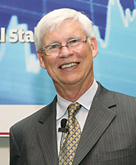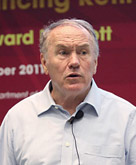|
HKUST's Institute for Advanced Study (IAS) co-hosts the UC RUSAL President's Forum at HKUST with UC RUSAL, the world's largest aluminium producer.
Jim O'Neill Provides Insight into the Future of BRICS
The University invited Dr Jim O'Neill, Chairman of Goldman Sachs Asset Management (GSAM) - the renowned economist who coined the prominent BRIC concept - to conduct his very first public lecture in Hong Kong. Dr O'Neill presented his views on the changing dynamics of the world and the rapid rise and importance of BRIC countries, as well as the current economic crisis.
The BRIC acronym has become synonymous with the remarkable rise of Brazil, Russia, India and China and their influence on the world economy. The concept of the "Next 11" on the other hand, is a simple description to bracket the 11 most populous countries and to see if they might have a BRIC-like impact on the world.
Talking about the rise of the 'Growth Markets', a grouping which includes the four BRIC countries and the four largest N-11 countries - namely, Mexico, South Korea, Indonesia and Turkey, Dr O'Neill shared his views on how their involvement will lead to great global prosperity. Following the lecture, Dr O'Neill engaged in a constructive dialogue with HKUST President Tony F Chan and answered questions from the audience.
Dr Jim O'Neill is currently the Chairman of GSAM and is responsible for overseeing the global operation of the Asset Management Division. Prior to assuming this role in September 2010, he was head of Global Economics, Commodities and Strategy Research. He joined Goldman Sachs in 1995 as a partner, co-head of Global Economics Research and Chief Currency Economist. Before joining Goldman Sachs, Dr O'Neill worked for Swiss Bank Corporation and the Bank of America.
In 2010 RUSAL and HKUST established a five-year cooperative agreement. Under the sponsorship of US$1.5 million, RUSAL would support the development of HKUST's Institute for Advanced Study, establish scholarships and conduct research project on the application of innovative technologies for using aluminium in construction. The UC RUSAL President's Forum welcomes the world's renowned speakers to Hong Kong.
IAS also hosted Nobel Lectures and Distinguished Lectures with top scholars, attracting enthusiastic response.
IAS Nobel Lecture
Prof David Gross
Prof David Gross from the University of California at Santa Barbara shared his insights on the present state of knowledge in elementary particle physics and the state of string theory. He also discussed the experimental revolutions that might occur at the Large Hadron Collider (LHC) now running at CERN, the world’s largest particle physics laboratory. Prof Gross won the 2004 Nobel Prize in Physics for his discovery of asymptotic freedom, which focuses on understanding the strong interactions that bind quarks and nuclear matter to string theory.
| |
 |
Prof Robert Engle
Prof Robert Engle from New York University delivered a lecture on 'Global Financial Stability and Long Run Risks'. At the talk, Prof Engle discussed the concept of risk management and how to utilize volatility models in making forecasts. Prof Engle was awarded the 2003 Nobel Prize in Economics Sciences for his breakthrough research on the concept of autoregressive conditional heteroskedasticity (ARCH), a statistical model of volatility that captured the tendency of stock prices and other financial variables to move between high volatility and low volatility periods. The finding was first mentioned in Econometrica, 1982. The model has become an essential tool used for asset pricing and evaluation of portfolio risk.
| |
 |
Prof Edward Prescott
Prof Edward Prescott, from Arizona State University and Federal Reserve Bank of Minneapolis believed that eliminating capital income taxes will greatly increase savings opportunities and make savings for retirement system feasible with only modest amount of government debt. In recognition of his contributions, Prof Prescott was awarded the 2004 Nobel Laureate in Economic Sciences.
IAS Distinguished Lecture
Prof Justin Yifu Lin
Prof Justin Yifu Lin, Senior Vice President and Chief Economist of the World Bank provided a framework to analyze the causes behind the dramatic changes of China's economy throughout the centuries. As a result, China has been the most dynamic economy in the world. He believed that the current economic theory does not apply to the Chinese economy and drawn some lessons from the Chinese experiences for other developing countries.
Prior to joining the Bank, Prof Lin served as the Founding Director and Professor of the China Centre for Economic Research (CCER) at Peking University. He had also been teaching at HKUST from 1995 to 2005.
|